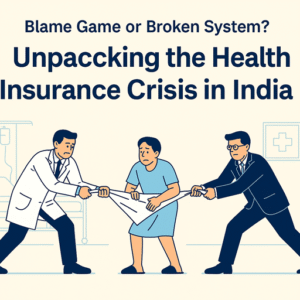
Blame Game or Broken System? Unpacking the Health Insurance Crisis in India
A patient is wheeled into surgery. The surgeon focuses, tools are prepped, monitors beep. Hours later, the patient is stable — life saved. But the next day, that same surgeon is defending a stapler cost to a TPA executive who’s never stepped into an OT.
This is not fiction. It’s everyday reality in the health insurance crisis in India — where doctors are asked to justify life-saving decisions to spreadsheet managers, patients are handed deduction-laced bills despite being insured, and hospitals balance on the edge of viability.
And yet, not every doctor is a savior, not every hospital is ethical, and not every insurer is corrupt. The truth is messier — and much more important to fix.
🥼 Doctors & the Health Insurance Crisis
Doctors are the most visible face of India’s healthcare system. While many work long hours and take immense risks, the health insurance crisis in India often pits them against patients and insurers alike.
A 2023 General Insurance Council report found 18% of insurance frauds involved doctor-linked overbilling or inflated testing. In Maharashtra, doctors signed off on unnecessary multi-day admissions to exploit package limits; in Bengaluru, a radiologist billed duplicate MRIs under different codes.
But these are not the norm — they highlight a trust-deficit environment. Doctors today are forced to defend every treatment to non-medical teams.
“We joined medicine to save lives — not argue with insurance departments.”
Blame alone won’t fix it. Reform must protect both ethics and effort in the context of the growing health insurance crisis in India.
🏥 Hospitals & the Health Insurance Crisis
The judiciary is also taking note. In a scathing observation, the Allahabad High Court remarked that “private hospitals have become more of a business hub treating patients as ATMs,” during a case involving unethical medical billing. The court’s remark reflects a wider public sentiment — that healthcare is drifting away from service and into commerce. (Source)
In a scathing remark, the Allahabad High Court recently observed that “private hospitals have become more of a business hub treating patients as ATMs,” while hearing a case on inflated and unethical medical billing. This sharp rebuke highlights the growing public and judicial awareness of the systemic misuse of insurance-based care. (Source)
Hospitals too walk a fine line in the health insurance crisis in India. They deal with claim delays, deduction battles, and arbitrary package caps. Many small and mid-tier hospitals bleed under insurance-based caseloads.
But there’s a dark side too — over-admission, ICU abuse, inflated consumable billing, and preferential treatment for higher-margin patients.
Corporate pressure has turned many hospitals into margin-chasing setups where patient care becomes protocol-driven commerce.
💼 Insurers, TPAs & the Health Insurance Crisis
Yes, fraud exists in the health insurance crisis in India. Fake claims, exaggerated procedures, and collusion aren’t myths. Insurers have to audit — and protect their books.
But the pendulum has swung too far. Claims are rejected on hyper-technicalities:
- “Not payable as per package norm”
- “Consultation exceeds capping”
- “ICU not pre-approved”
All while the patient — unaware of these silent exclusions — feels betrayed.
Worse, many TPAs lack clinical expertise, yet override real medical judgment.
🧩 The Real Problem: A System Without Shared Rules
What’s broken is not just trust — but structure.
There’s no central health package registry. No real-time disclosure for patients. No unified grievance platform. Everyone is acting in silos:
- Doctors doing damage control
- Hospitals lobbying for packages
- Insurers minimising exposure
- Patients caught in a fog of jargon
🔧 The Fix: Focus on Framework, Not Finger-Pointing
- Transparency Mandate: IRDAI must require insurers to disclose pre-admission expectations, coverage, exclusions — in writing.
- Clinical Audit Teams: TPAs must include registered doctors for claim evaluations, not admin staff only.
- Hospital Grading & Penalties: Hospitals with consistent fraud flags must be delisted. But those following norms should be protected from arbitrary exclusions.
- Single Health Claim Dashboard: Like a courier tracker — claim status, deductions, and reasons visible to hospital + patient in real time.
- IRDAI Watchdog Role: Not just policy framing — active enforcement of SLAs, penalty for delays, and audit of TPAs.
🎯 Final Thought: Everyone’s Tired — But No One’s Talking Together
The health insurance crisis in India isn’t about good vs bad. It’s about a structure where incentives are misaligned, transparency is missing, and trust is absent.
Until we stop blaming each other — and start co-designing the rules — patients will continue to suffer. And healthcare will remain a battlefield of egos, audits, and escape clauses.
Related Reads:
External Resource:
Tags: health insurance crisis in India, TPA issues, hospital billing problems, IRDAI reforms, insurance claim delays
Have you faced confusion or delay in your insurance claim? Share your story in the comments or tag us on LinkedIn @TheFinPulse. Let’s make the system accountable.

TPAs are the Worst Offenders in this Entire Game. They are the Ones who are hand in glove with every stakeholder in the entire Healthcare/Health Insurance Spectrum. They have a Fee for Everything and THIS FEE FACTOR is raising the Healthcare Cost which no one is able to see.